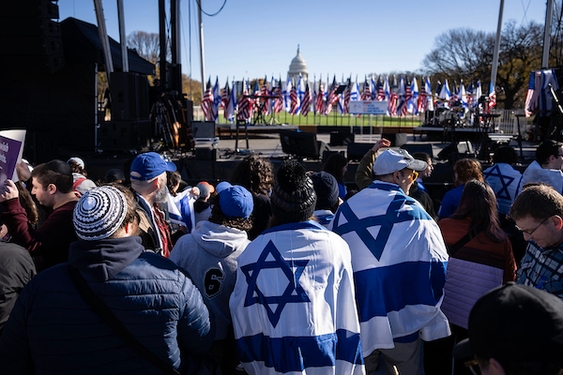Supporters of Israel flocked Tuesday to the National Mall for the biggest pro-Israel rally in a generation, intent on showing solidarity as the war with Hamas rages.
“It’s been quite a few years since we felt like there was an existential crisis for Israel,” said Joel Schwitzer, the Dallas-area director of the American Jewish Committee, one of hundreds of North Texans who headed to Washington for the March for Israel. “This feels different than anything I can remember.”
Security was tight, with streets around the National Mall closed and a heavy presence of police. Busloads from synagogues across the Northeast headed for the capital as groups from Texas and even farther arrived by plane.
National Jewish groups announced the rally last week to counteract growing animosity towards Israel, and antisemitism that has spiked since the conflict started.
The 2-hour rally was scheduled to start at noon Dallas time, with Congress in session.
The timing was no accident.
Congress has yet to act on President Joe Biden’s request for $14 billion in security assistance for Israel, which has been bogged down amid resistance to other requests for $9 billion in humanitarian aid for Gaza and $61 billion for Ukraine.
The new House speaker, Mike Johnson, R-La., was scheduled to address the crowd. So were the top Democrats in Congress: House Minority Leader Hakeem Jeffries and Senate Majority Leader Chuck Schumer, both New Yorkers.
The lineup also includes Israeli President Isaac Herzog and John Hagee, senior pastor at San Antonio’s Cornerstone Church and a staunch supporter of Israel.
Relatives of some of the 240 hostages still held in Gaza will speak, as will Natan Sharansky, a former Soviet dissident who spent years trying to emigrate.
A 1987 march to protest Soviet oppression of Jews drew 250,000 people. During a Palestinian uprising in 2002, 100,000 Israel supporters gathered at the Capitol.
The current crisis has forged rare unity between secular and religious Jews, and even between factions that support and oppose Prime Minister Benjamin Netanyahu’s policies of expansion into the West Bank.
“I’m not a religious person,” said Dallas resident Arona Ackermann, 53, whose grandparents fled Lithuania in 1933 for what became the nation of Israel in 1948. Given the current peril, she feels an “intense obligation” to honor the sacrifices “from all of my ancestors” and those defending Israel now.
“I want the Palestinians to have peace and I want them to build their own country alongside us, and I want them to either leave us alone or partner with us,” she said.
The conflict began with a series of raids Oct. 7 that killed 1,200 people, organized by Hamas, which the United States and European Union view as terrorists. The Iran-backed group, whose goals include driving all Jews out of Israel, has controlled Gaza since 2006.
Israel identified roughly 70% of the dead as unarmed civilians, including children and elderly.
Some bodies were burned and mutilated.
“It’s important to remember the sheer barbarism of the attacks of October 7,” said Schwitzer. “No country would allow that to happen unchecked.”
Israel’s response has been fierce. After weeks of bombardment and a ground operation still underway, the Hamas-run Gaza Health Ministry has put the death toll at more than 11,100 people. Most are women and children.
That’s one in every 200 people in Gaza.
As news outlets have documented, that was a big part of the Hamas strategy — to provoke a heavy handed response that would turn world opinion against Israel.
The assault was also meant to halt a growing thaw in Arab-Israeli relations, which Hamas feared would ease pressure over the Palestinian cause. Iran was especially alarmed by an impending pact between Israel and Saudi Arabia, its top regional rival.
Israeli tanks reached the gates of Al Shifa Hospital, the largest in Gaza, on Monday.
Israel says Hamas uses tunnels under the hospital as a headquarters. American officials support the assertion but also echo growing international concerns about the hundreds of patients and medical personnel who have not evacuated, despite Israel’s urging to do so.
Gaza health officials say 32 patients have died since Saturday, including newborns whose incubators were unable to run for lack of power.
“We can all mourn that destruction even as we understand that Hamas has put Israel in a position where Israel’s response is necessary,” said Schwitzer.
A Nov. 4 pro-Palestinian march in Washington drew tens of thousands of protesters.
A huge march in London last weekend drew 300,000 people, according to police.
Pro-Palestinian protesters have demanded a ceasefire. Israel rejects the idea, arguing that would let Hamas regroup.
The Jewish Federations of North America and the Conference of Presidents of Major American Jewish Organizations spearheaded the March for Israel.
Underscoring the significance, all five members of the clergy at Dallas’ conservative Congregation Shearith Israel planned to attend, along with dozens of congregants.
Ackermann has kept close watch on developments.
Her brother lives in Israel. Her husband, a lawyer, is heading there later this month to spend two weeks as a volunteer, performing tasks that free up soldiers for more important work.
Their son is in Jerusalem on a gap semester before college. Since the fighting started, he’s had a weekly reservation to fly home, just in case.
“If Israel can’t be home for Jewish people, and all people to live in safety, then where can he go?” she said.
______
©2023 The Dallas Morning News. Distributed by Tribune Content Agency, LLC.




